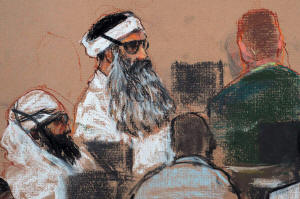Biden administration asks court to block plea deal for alleged
mastermind of 9/11 attacks
 Send a link to a friend
Send a link to a friend
 [January 08, 2025]
By ERIC TUCKER and ELLEN KNICKMEYER [January 08, 2025]
By ERIC TUCKER and ELLEN KNICKMEYER
WASHINGTON (AP) — The Biden administration asked a federal appeals court
on Tuesday to block a plea agreement for accused 9/11 mastermind Khalid
Sheikh Mohammed that would spare him the risk of the death penalty in
one of the deadliest attacks ever on the United States.
The Justice Department argued in a brief filed with a federal appeals
court in the District of Columbia that the government would be
irreparably harmed if the guilty pleas were accepted for Mohammed and
two co-defendants in the Sept. 11, 2001, attacks.
It said the government would be denied a chance for a public trial and
the opportunity to “seek capital punishment against three men charged
with a heinous act of mass murder that caused the death of thousands of
people and shocked the nation and the world.”
The Defense Department negotiated and approved the plea deal but later
repudiated it. Attorneys for the defendants argue the deal is already
legally in effect and that Defense Secretary Lloyd Austin, who began the
administration's efforts to throw it out, acted too late.

When the appeal was filed Tuesday, family members of some the nearly
3,000 people killed in the al-Qaida attacks already were gathered at the
U.S. naval base in Guantanamo Bay, Cuba, to hear Mohammed's scheduled
guilty plea Friday. The other two men, accused of lesser roles in 9/11,
were due to enter them next week.
Family members have been split on the deal, with some calling it the
best resolution possible for a prosecution mired for more than a decade
in pretrial hearings and legal and logistical difficulties. Others
demanded a trial and — they hoped — execution.
Some legal experts have warned that the legal challenges posed by the
case, including the men’s torture under CIA custody after their capture,
could keep the aging detainees from ever facing verdicts and any
possible sentences.
Military prosecutors this summer notified families of the victims that
the senior Pentagon official overseeing Guantanamo had approved a plea
deal after more than two years of negotiations. The deal was “the best
path to finality and justice,” military prosecutors said.
[to top of second column]
|

This Monday, Dec. 8, 2008 courtroom drawing by artist Janet Hamlin
and reviewed by the U.S. military, shows Khalid Sheikh Mohammed,
center, and co-defendant Walid Bin Attash, left, attending a
pre-trial session at Guantanamo Bay Naval Base, Cuba. (AP
Photo/Janet Hamlin, Pool, File)

But some family members and Republican lawmakers condemned the deal
and the Biden administration for reaching it.
Austin has fought unsuccessfully since August to throw out the
agreement, saying that a decision on death penalties in an attack as
grave as the Sept. 11 plot should only be made by the defense
secretary.
A military judge at Guantanamo and a military appeals panel rejected
those efforts, saying he had no power to throw out the agreement
after it had been approved by the senior Pentagon official for
Guantanamo.
Defense attorneys say the plea agreement was approved by Austin's
own officials and military prosecutors and that his intervention was
unlawful political interference in the justice system.
The Justice Department brief Tuesday said the defendants would not
be harmed by a short delay, given that the prosecution has been
ongoing since 2012 and the plea agreements would likely result in
them serving long prison sentences, potentially for the rest of
their lives.
"A short delay to allow this Court to weigh the merits of the
government’s request in this momentous case will not materially harm
the respondents,” the government argued.
The Justice Department criticized the military commission judge for
a ruling that it said “improperly curtailed” the defense secretary’s
authority in a “case of unique national importance.” Preserving that
authority "is a matter of critical importance warranting the
issuance of extraordinary relief,” the government’s filing said.
All contents © copyright 2024 Associated Press. All rights reserved
 |